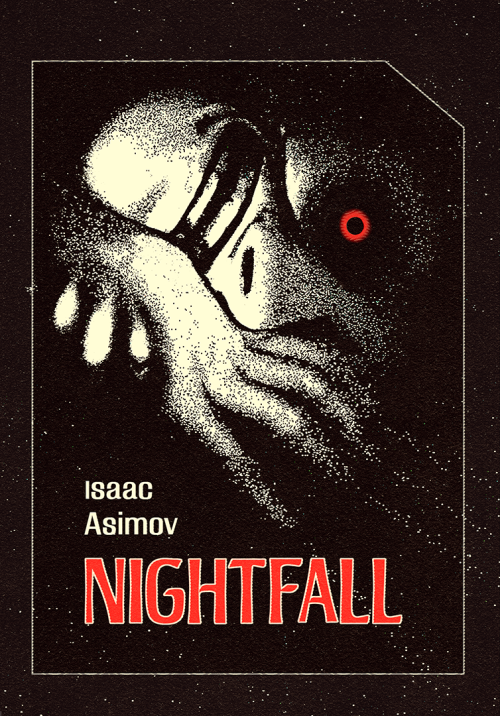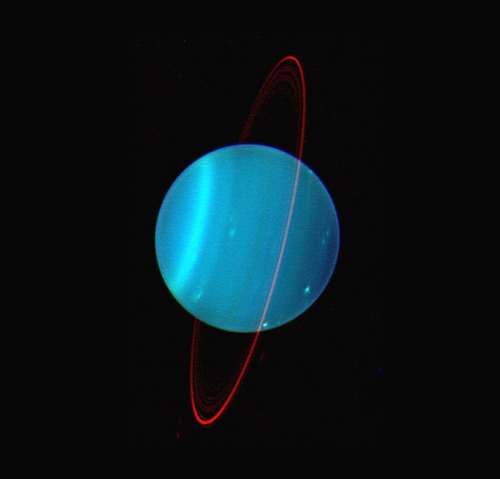Book Cover Assignment For Class, We Had Three Short Scifi Stories To Choose From And I Chose Isaac Asimov’s “Nightfall”.


Book cover assignment for class, we had three short scifi stories to choose from and I chose Isaac Asimov’s “Nightfall”. 🔴🌌
More Posts from Starry-shores and Others
Celebrating Five Years at Jupiter!
We just released new eye-catching posters and backgrounds to celebrate the five-year anniversary of Juno’s orbit insertion at Jupiter in psychedelic style.

On July 4, 2016, our Juno spacecraft arrived at Jupiter on a mission to peer through the gas giant planet’s dense clouds and answer questions about the origins of our solar system. Since its arrival, Juno has provided scientists a treasure trove of data about the planet’s origins, interior structures, atmosphere, and magnetosphere.

Juno is the first mission to observe Jupiter’s deep atmosphere and interior, and will continue to delight with dazzling views of the planet’s colorful clouds and Galilean moons. As it circles Jupiter, Juno provides critical knowledge for understanding the formation of our own solar system, the Jovian system, and the role giant planets play in putting together planetary systems elsewhere.
Get the posters and backgrounds here!
For more on our Juno mission at Jupiter, follow NASA Solar System on Twitter and Facebook.
Make sure to follow us on Tumblr for your regular dose of space!

Say hello to globular cluster 47 Tucanae 👋
This glittery spray of ancient stars is about 16,700 light-years away from Earth toward the constellation Tucana. Globular clusters like this one are isolated star cities, home to hundreds of thousands of stars that are held together by their mutual gravity. And like the fast pace of cities, there’s plenty of action in these stellar metropolises. The stars are in constant motion, orbiting around the cluster’s center.
Past observations have shown that the heavyweight stars tend to crowd into the “downtown” core area, while lightweight stars reside in the less populated suburbs. But as heavyweight stars age, they rapidly lose mass, cool down and shut off their nuclear furnaces. After the purge, only the stars’ bright, superhot cores – called white dwarfs – remain. This weight loss program causes the now lighter-weight white dwarfs to be nudged out of the downtown area through gravitational interactions with heftier stars.
Until these Hubble observations, astronomers had never seen the dynamic conveyor belt in action. The Hubble results reveal young white dwarfs amid their leisurely 40-million-year exodus from the bustling center of the cluster.
Make sure to follow us on Tumblr for your regular dose of space: http://nasa.tumblr.com.
Here are some interesting facts about the raven:
• They are one of the most intelligent birds on the planet - they can solve tasks, play tricks on other animals and can count
• Ravens can imitate human speech just like parrots
• They can reach 2 feet in size from head to tail - bigger than some cats
• Ravens do things just for fun, such as sliding down snowy hills, swooping when flying, and they even build their own toys out of sticks and rocks
• People who have owned ravens have said they are cat-like in nature and can be very cuddly and affectionate, but can throw a strop when they don't get their way
• Science has found that ravens can communicate by "gesturing", and point their beak in certain directions to tell other ravens where to go
• When they reach adolescence, ravens leave their parents to find other teenage ravens and join "teenage gangs"
• Ravens are monogamous and mate for life
• Although they have been seen for centuries to represent death and sadness, ravens are compassionate, loving animals and will console their raven friends if they have been injured
All in all, ravens are amazing and beautiful animals!





My God, it’s full of stars
- Dave Bowman, 2001 a Space Odyssey
When you look up from a dark site on a clear moonless night, the sky appears full of stars, almost too many to count.
It turns out that, with the naked eye, one can see anywhere between 5000 to 10000 stars, depending on whom you ask and how they estimate this number and just half of that on a given night because the Earth gets in your way. Still a lot but really nothing when you consider there are billions - maybe hundreds of billions of stars in our Galaxy and trillions of galaxies in the Universe.
It’s a completely different matter when you use optical aid. A pair of 50 mm binoculars can pull in some hundreds of thousands of stars; a small - say 80 mm telescope - like mine-can “ see” millions.
And here is an example. This is the much loved deep southern object known familiarly as 47 Tucanae- Tuc 47 to friends- and it is what is known as a globular cluster.
It contains over a million stars - I am unable to determine what the latest estimate is- a couple of decades ago we used to say it contained half a million stars but that estimate has since been upped.
It’s the second largest of this type of cluster- there are around 150 of these distributed in a halo around our galaxy that we know of.
And quite spectacular in a telescope of any size. It cannot but bring to mind Dave Bowman’s famous exclamation in “2001 a Space Odyssey “
Imaged from my backyard last weekend; an image salvaged despite the usual trials and tribulations that beset the amateur astrophotographer including tangled cables and the camera slamming into the tripod leg and so on and so forth.
Given the long weather forecast it’s going to be slim pickings this summer so you take what you get
What would it be like to live on a planet within a globular cluster? In 1941 Issac Asimov wrote a great short story “ Nightfall “ imagining just that. Highly recommended if you have forgotten it
Sadly the Hubble Space Telescope looked for planets in Tuc 47… and found none. So we have no evidence that planets form within these globular clusters- thus far
https://flic.kr/p/2mGS9cC
Ten interesting facts about Uranus
Like the classical planets, Uranus is visible to the naked eye, but it was never recognised as a planet by ancient observers because of its dimness and slow orbit. Sir William Herschel announced its discovery on 13 March 1781, expanding the known boundaries of the Solar System for the first time in history and making Uranus the first planet discovered with a telescope.

Uranus is the seventh planet from the Sun. It has the third-largest planetary radius and fourth-largest planetary mass in the Solar System. Uranus is similar in composition to Neptune, and both have different bulk chemical composition from that of the larger gas giants Jupiter and Saturn.

(The five largest moons of Uranus) Like all of the giant planets, Uranus has its share of moons. At present, astronomers have confirmed the existence of 27 natural satellites. But for the most part, these moons are small and irregular.

Uranus’ moons are named after characters created by William Shakespeare and Alexander Pope. These include Oberon, Titania and Miranda. All are frozen worlds with dark surfaces. Some are ice and rock mixtures. The most interesting Uranian moon is Miranda; it has ice canyons, terraces, and other strange-looking surface areas.

Only one spacecraft in the history of spaceflight has ever made a close approach to Uranus. NASA’s Voyager 2 conducted its closest approach to Uranus on January 24th, 1986, passing within 81,000 km of the cloud tops of Uranus. It took thousands of photographs of the gas/ice giant and its moons before speeding off towards its next target: Neptune.

Uranus has rings: All the gas and ice giants have their own ring systems, and Uranus’ is the second most dramatic set of rings in the Solar System.

Uranus makes one trip around the Sun every 84 Earth years. During some parts of its orbit one or the other of its poles point directly at the Sun and get about 42 years of direct sunlight. The rest of the time they are in darkness.

All of the planets in the Solar System rotate on their axis, with a tilt that’s similar to the Sun. In many cases, planet’s have an axial tilt, where one of their poles will be inclined slightly towards the Sun. But the axial tilt of Uranus is a staggering 98 degrees! In other words, the planet is rotating on its side.

Uranus is approximately 4 times the sizes of Earth and 63 times its volume.

Uranus is blue-green in color, the result of methane in its mostly hydrogen-helium atmosphere. The planet is often dubbed an ice giant, since 80 percent or more of its mass is made up of a fluid mix of water, methane, and ammonia ices.

Uranus hits the coldest temperatures of any planet. With minimum atmospheric temperature of -224°C Uranus is nearly coldest planet in the solar system. While Neptune doesn’t get as cold as Uranus it is on average colder. The upper atmosphere of Uranus is covered by a methane haze which hides the storms that take place in the cloud decks.
source
source
source
Images credit: NASA/ wikipedia







russia’s lake baikal - the world’s oldest, largest (by volume) and deepest freshwater lake - freezes over for half the year, creating clear, turquoise shards of ice. (photos x, x x, x, x, x)




Erupcion Cordon Caulle, Region de Los Rios, Chile. by Francisco Negroni
-
 sewerelk liked this · 1 week ago
sewerelk liked this · 1 week ago -
 decepticupcake reblogged this · 5 months ago
decepticupcake reblogged this · 5 months ago -
 mysortofstar liked this · 6 months ago
mysortofstar liked this · 6 months ago -
 orcadianrider reblogged this · 8 months ago
orcadianrider reblogged this · 8 months ago -
 boyd-clowder reblogged this · 1 year ago
boyd-clowder reblogged this · 1 year ago -
 boyd-clowder liked this · 1 year ago
boyd-clowder liked this · 1 year ago -
 kuronightgl liked this · 1 year ago
kuronightgl liked this · 1 year ago -
 krippe90 reblogged this · 1 year ago
krippe90 reblogged this · 1 year ago -
 jell-hell reblogged this · 1 year ago
jell-hell reblogged this · 1 year ago -
 spottedsnake reblogged this · 1 year ago
spottedsnake reblogged this · 1 year ago -
 outsiderblues reblogged this · 1 year ago
outsiderblues reblogged this · 1 year ago -
 demons-need-inspiration reblogged this · 1 year ago
demons-need-inspiration reblogged this · 1 year ago -
 nac013 liked this · 1 year ago
nac013 liked this · 1 year ago -
 crimson8honey reblogged this · 1 year ago
crimson8honey reblogged this · 1 year ago -
 crimson8honey liked this · 1 year ago
crimson8honey liked this · 1 year ago -
 perpetually-dehydrated liked this · 1 year ago
perpetually-dehydrated liked this · 1 year ago -
 fleshboneandbile liked this · 1 year ago
fleshboneandbile liked this · 1 year ago -
 categoricalterror reblogged this · 1 year ago
categoricalterror reblogged this · 1 year ago -
 fleshisfun liked this · 1 year ago
fleshisfun liked this · 1 year ago -
 maria-woods-blog1 liked this · 1 year ago
maria-woods-blog1 liked this · 1 year ago -
 goatinhumanskin liked this · 1 year ago
goatinhumanskin liked this · 1 year ago -
 glimmerofyou liked this · 1 year ago
glimmerofyou liked this · 1 year ago -
 horrorgrub reblogged this · 1 year ago
horrorgrub reblogged this · 1 year ago -
 dustydonty liked this · 1 year ago
dustydonty liked this · 1 year ago -
 krshush liked this · 1 year ago
krshush liked this · 1 year ago -
 mistyfalcon reblogged this · 1 year ago
mistyfalcon reblogged this · 1 year ago -
 yahchilles liked this · 1 year ago
yahchilles liked this · 1 year ago -
 toweroflondon liked this · 1 year ago
toweroflondon liked this · 1 year ago -
 plasticalien reblogged this · 1 year ago
plasticalien reblogged this · 1 year ago -
 ithoughtiwasan-alien liked this · 1 year ago
ithoughtiwasan-alien liked this · 1 year ago -
 girlhelp2003 liked this · 1 year ago
girlhelp2003 liked this · 1 year ago -
 consulting-defective liked this · 1 year ago
consulting-defective liked this · 1 year ago -
 goofyman3434 liked this · 1 year ago
goofyman3434 liked this · 1 year ago -
 junimoss liked this · 1 year ago
junimoss liked this · 1 year ago -
 blood-guts-n-choco-cake reblogged this · 1 year ago
blood-guts-n-choco-cake reblogged this · 1 year ago -
 septic-9mil liked this · 1 year ago
septic-9mil liked this · 1 year ago -
 lucazoqui liked this · 1 year ago
lucazoqui liked this · 1 year ago -
 tru3-r0y4lty liked this · 1 year ago
tru3-r0y4lty liked this · 1 year ago -
 elvenking42 liked this · 1 year ago
elvenking42 liked this · 1 year ago -
 no-face-no-shame liked this · 1 year ago
no-face-no-shame liked this · 1 year ago -
 makifole liked this · 1 year ago
makifole liked this · 1 year ago -
 deadlungsdead liked this · 1 year ago
deadlungsdead liked this · 1 year ago -
 alternativeproject reblogged this · 1 year ago
alternativeproject reblogged this · 1 year ago -
 alternativeproject liked this · 1 year ago
alternativeproject liked this · 1 year ago -
 little-mousy-boy liked this · 1 year ago
little-mousy-boy liked this · 1 year ago -
 devcrap liked this · 1 year ago
devcrap liked this · 1 year ago -
 wind0eye liked this · 1 year ago
wind0eye liked this · 1 year ago

Amateur astronomer, owns a telescope. This is a side blog to satiate my science-y cravings! I haven't yet mustered the courage to put up my personal astro-stuff here. Main blog : @an-abyss-called-life
212 posts








